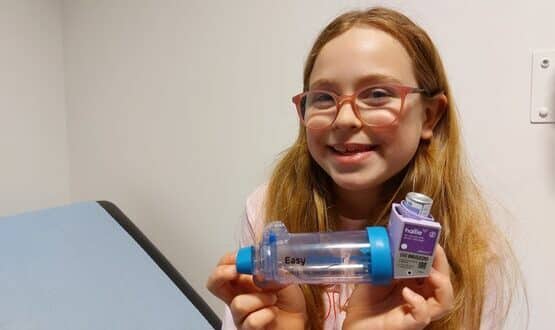Asthma app monitors children’s symptoms to reduce risk of attacks

A new app being trialled at Sheffield Children’s Hospital helps children manage their asthma as well as alerting parents to worsening symptoms.
The Asthma+me App, a partnership between the hospital and Aseptika, allows the child, parent, or other family members to enter information about their asthma and link up their Aseptika smart inhalers.
The app collects this information and helps educate the child and the family about their severe asthma. The information can also be used to predict when an asthma attack is likely to happen, sending a warning to the patient and parents.
Professor Heather Elphick, paediatric respiratory consultant at the hospital, identified the need for technology to support children aged 6 to 12. She has been collaborating with Aseptika for over two years.
“The app is an innovative way of extending our support at the hospital through technology to children and their families at home,” she said.
“It can help families further understand when an asthma attack may happen, monitor their child’s asthma consistently through the app and perhaps prevent trips to hospital in the future.”
Quick reaction to an asthma attack can be the difference between life and death.
Last week shock new figures revealed deaths from asthma attacks are up 33% in the last ten years.
More than 1,400 people died from an asthma attack last year, an 8% increase compared to 2017.
Asthma UK called in NHS England to take urgent action to reduce the number of people suffering fatal asthma attacks.
Smart inhalers are considered one of the solutions the rising number of deadly asthma attacks, with the NHS Long Term Plan committing to trial the use of the devices for better patient care and the remote monitoring of conditions.
Currently 90% of NHS spend on asthma goes on medicines, but incorrect usage of medication also contributes to poor health outcomes. Smart inhalers offer a solution by monitoring how and when a patient is using their medication.
Kevin Auton, managing director of Aseptika, said: “Asthma is still the most common medical condition for children and young people in the UK, and is the number one reason for urgent admissions to hospital in England.
“There are still a small number of avoidable deaths in children and young people from asthma every year, meaning the UK has the third highest risk of death from childhood asthma in developed countries.
“We created this app with the team at Sheffield Children’s to help the whole family better cope with their child’s asthma. Though symptoms are under control after support from their GP or hospital consultant, families still feel they need support at home.
“The app we’ve created can hopefully decrease the amount of appointments needed: children can spend more time at school or playing with the knowledge that their asthma is being managed.”
The Asthma+me app also includes a complete educational programme, electronic personalised asthma care and action plan, which can be printed and given to the child’s school, friends and GP to explain what to do in the event of an asthma attack.
It’s designed to automatically send the child’s data to their electronic patient record at the hospital each week.
NHS England was contacted for comment on the trial of smart inhalers.




